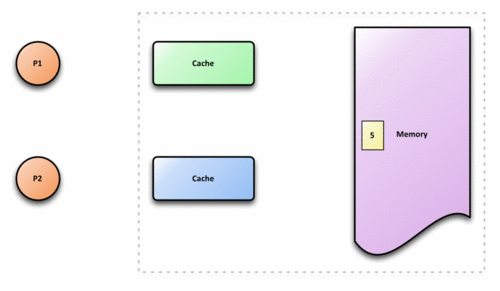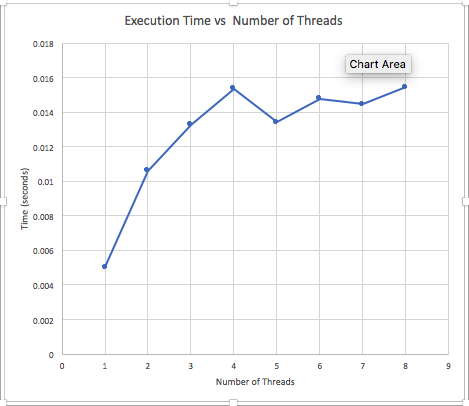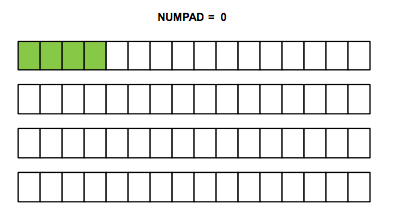Team False Sharing
Contents
Analyzing False Sharing and Ways to Eliminate False Sharing
Team Members
Introduction
What is False Sharing (aka cache line ping-ponging)?
False Sharing is one of the sharing pattern that affect performance when multiple threads share data. It arises when at least two threads modify or use data that happens to be close enough in memory that they end up in the same cache line. False sharing occurs when they constantly update their respective data in a way that the cache line migrates back and forth between two threads' caches.
In this article, we will look at some examples that demonstrate false sharing, tools to analyze false sharing, and the two coding techniques we can implement to eliminate false sharing.
Cache Coherence
In Symmetric Multiprocessor (SMP)systems , each processor has a local cache. The local cache is a smaller, faster memory which stores copies of data from frequently used main memory locations. Cache lines are closer to the CPU than the main memory and are intended to make memory access more efficient. In a shared memory multiprocessor system with a separate cache memory for each processor, it is possible to have many copies of shared data: one copy in the main memory and one in the local cache of each processor that requested it. When one of the copies of data is changed, the other copies must reflect that change. Cache coherence is the discipline which ensures that the changes in the values of shared operands(data) are propagated throughout the system in a timely fashion. To ensure data consistency across multiple caches, multiprocessor-capable Intel® processors follow the MESI (Modified/Exclusive/Shared/Invalid) protocol. On first load of a cache line, the processor will mark the cache line as ‘Exclusive’ access. As long as the cache line is marked exclusive, subsequent loads are free to use the existing data in cache. If the processor sees the same cache line loaded by another processor on the bus, it marks the cache line with ‘Shared’ access. If the processor stores a cache line marked as ‘S’, the cache line is marked as ‘Modified’ and all other processors are sent an ‘Invalid’ cache line message. If the processor sees the same cache line which is now marked ‘M’ being accessed by another processor, the processor stores the cache line back to memory and marks its cache line as ‘Shared’. The other processor that is accessing the same cache line incurs a cache miss.
Identifying False Sharing
False sharing occurs when threads on different processors modify variables that reside on the same cache line. This invalidates the cache line and forces an update, which hurts performance.
False sharing is a well-know performance issue on SMP systems, where each processor has a local cache. it occurs when treads on different processors modify varibles that reside on th the same cache line like so.
Media:CPUCacheline.png
The frequent coordination required between processors when cache lines are marked ‘Invalid’ requires cache lines to be written to memory and subsequently loaded. False sharing increases this coordination and can significantly degrade application performance.
In Figure, threads 0 and 1 require variables that are adjacent in memory and reside on the same cache line. The cache line is loaded into the caches of CPU 0 and CPU 1. Even though the threads modify different variables, the cache line is invalidated forcing a memory update to maintain cache coherency.
#include <iostream>
#include <omp.h>
#include "timer.h"
#define NUM_THREADS 8
int main(int argc, const char * argv[]) {
struct s{
float value;
}Array[4];
int numThreadsUsed;
const int SomeBigNumber = 100000000;
omp_set_num_threads(NUM_THREADS);
double start_time = omp_get_wtime();
#pragma omp parallel for
for(int i = 0; i < 4;i++){
if(i ==0){numThreadsUsed = omp_get_num_threads();}
for(int j = 0;j < SomeBigNumber;j++){
Array[i].value = Array[i].value + (float)rand();
}
}
double time = omp_get_wtime() - start_time;
std::cout<<time<<std::endl;
std::cout<<"Threads Used: "<<numThreadsUsed<<std::endl;
return 0;
}As you can see the execution time increase with the number of threads. These results are not what you would expect but there are 2 reasons that may have caused this. The first is that the overhead for creating and maintaining the threads is overwhelming larger than the contents of the for loop. The second is False sharing.
Eliminating False Sharing
Thread Local Variables
Padding
#include <iostream>
#include <omp.h>
#include "timer.h"
#define NUMPAD 7
#define NUM_THREADS 8
int main(int argc, const char * argv[]) {
struct s{
float value;
int pad[NUMPAD];
}Array[4];
Timer stopwatch;
int numThreadsUsed;
const int SomeBigNumber = 100000000;
omp_set_num_threads(NUM_THREADS);
double start_time = omp_get_wtime();
#pragma omp parallel for
for(int i = 0; i < 4;i++){
if(i ==0){numThreadsUsed = omp_get_num_threads();}
for(int j = 0;j < SomeBigNumber;j++){
Array[i].value = Array[i].value + (float)rand();
}
}
double time = omp_get_wtime() - start_time;
std::cout<<time<<std::endl;
std::cout<<"Threads Used: "<<numThreadsUsed<<std::endl;
return 0;
}

